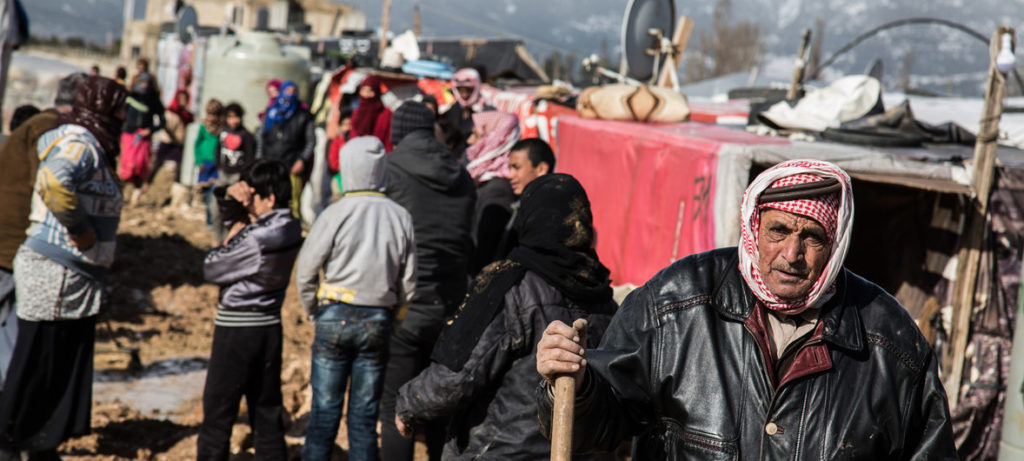Storms and Snow in Lebanon Worsen Plight for Syrian Refugees
HUMAN RIGHTS, MIDDLE EAST AND NORTH AFRICA, SYRIA IN CONTEXT, 14 Jan 2019
UN News – TRANSCEND Media Service
Storm-force winds and snow across Lebanon have worsened the plight for tens of thousands of Syrian refugees who’ve been forced from their homes by nearly eight years of conflict, a top UN humanitarian official said.
10 Jan 2019 – Speaking to journalists in Geneva, Philippe Lazzarini, Resident and Humanitarian Coordinator for Lebanon, said that refugees had been moved from shelters – including in the exposed Bekaa valley where wintery conditions are especially acute – to safer facilities, after Storm Norma hit at the weekend.
“Some of the settlements have been completely flooded, very cold, it’s extremely inclement conditions, and to describe daily life, it’s just miserable,” he said.
“What’s important is, if returns are taking place, it takes place in an environment where people feel confident enough to go back and where you have the necessary trust”
— UN Coordinator Philippe Lazzarini
Although the number of Syrian refugees officially hosted by Lebanon is more than 900,000, registration ended in 2014, and it is estimated that the real figure is between 1.2 and 1.3 million.
Around 70 per cent live under the poverty line, Mr. Lazzarini said, noting that this was in fact an improvement on 2017, when the number was even higher.
This high ratio of refugees to nationals – around one in four – would be “unthinkable and unacceptable” anywhere else, the UN official said, before playing down “tensions” between host Lebanese communities, 10 to 20 per cent of whom live below the poverty line.
Rejecting suggestions that the refugee situation alone was responsible for discontent within the country, the Resident and Humanitarian Coordinator noted that its leaders have been in “deadlock” and unable to agree on a power-sharing arrangement for effective central governance, despite elections last year.

Syrian refugees gather outside their shelters following a winter storm which brought rain and snow, at an informal settlement in Haoush Harime, in Bekaa Valley, Lebanon. UNICEF/UN0158355/Halldorsson
“Today I would say there is an atmosphere of anxiety in the country which is very much related to the political deadlock,” he said. “The inability to put in place a cabinet, the inability to decide and put in place the long-overdue reform, combined with the economic situation, combined with the geo-politics in the region and the refugees.”
International support and solidarity for the Lebanon situation remains strong, Mr. Lazzarini insisted, amounting to up to $1.5 billion per year since 2015.
Nonetheless, he cautioned that eight years into the crisis, humanitarian funding “might have reached a ceiling” and that other longer-term development funding may need to be found, notably for education projects requiring a minimum four-year investment.
For returnees, ‘trust’ paramount
Asked about how many Syrian refugees have chosen to return to their war-scarred country, the UN official explained that only 16,000 to 17,000 registered with authorities in Damascus during 2018 – a slight increase on the previous year, when no more than 13,000 went home.
Suggestions that the UN had prevented people from doing so were incorrect, he insisted, noting that the organization ensured that returnees had all the “necessary documentation” they needed, such as birth and marriage certificates, to avoid difficulties reintegrating back into Syrian life.
“Ultimately people will decide if yes or not, if they are confident enough to return,” he said. “What’s important is, if returns are taking place, it takes place in an environment where people feel confident enough to go back and where you have the necessary trust.”
Latest UN figures indicate that there are more than 5.6 million Syrian refugees outside the war-torn country; Turkey hosts most, at 3.6 million.
Next is Lebanon, at more than 900,000, followed by Jordan (670,000), Iraq (250,000) and Egypt (130,000), while North Africa shelters 35,000.
DISCLAIMER: The statements, views and opinions expressed in pieces republished here are solely those of the authors and do not necessarily represent those of TMS. In accordance with title 17 U.S.C. section 107, this material is distributed without profit to those who have expressed a prior interest in receiving the included information for research and educational purposes. TMS has no affiliation whatsoever with the originator of this article nor is TMS endorsed or sponsored by the originator. “GO TO ORIGINAL” links are provided as a convenience to our readers and allow for verification of authenticity. However, as originating pages are often updated by their originating host sites, the versions posted may not match the versions our readers view when clicking the “GO TO ORIGINAL” links. This site contains copyrighted material the use of which has not always been specifically authorized by the copyright owner. We are making such material available in our efforts to advance understanding of environmental, political, human rights, economic, democracy, scientific, and social justice issues, etc. We believe this constitutes a ‘fair use’ of any such copyrighted material as provided for in section 107 of the US Copyright Law. In accordance with Title 17 U.S.C. Section 107, the material on this site is distributed without profit to those who have expressed a prior interest in receiving the included information for research and educational purposes. For more information go to: http://www.law.cornell.edu/uscode/17/107.shtml. If you wish to use copyrighted material from this site for purposes of your own that go beyond ‘fair use’, you must obtain permission from the copyright owner.
Read more
Click here to go to the current weekly digest or pick another article:
HUMAN RIGHTS:
- How the Human Rights Industry Manufactures Consent for “Regime Change”
- Genocide Emergency: Gaza and the West Bank 2024
- ‘We Will Leave When the Last Palestinian Leaves’: The Defiant Last Stand of the Doctors of Kamal Adwan Hospital
MIDDLE EAST AND NORTH AFRICA:
- How Arab-Muslim Leaders Betrayed the People
- Thirty Years of Middle East Lies just Keep Coming Back to Haunt Us
- Israeli Atrocities Continue in Lebanon
SYRIA IN CONTEXT: